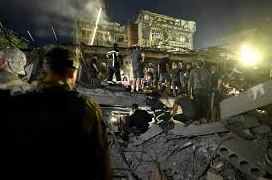Aid efforts are hampered by ongoing civil conflict, with the death toll set to rise above 3,000 as survivors await critical support.
The aftermath of the devastating 7.7-magnitude earthquake that struck Myanmar on March 28 has left thousands without food, water, and shelter. As the death toll rises, aid groups have emphasised the urgent need for basic supplies in the worst-hit areas. More than 2,700 people have lost their lives, with the death toll expected to surpass 3,000, according to Myanmar’s military leader, Senior General Min Aung Hlaing.
The earthquake, the strongest to hit Myanmar in over a century, caused widespread destruction, collapsing both ancient pagodas and modern buildings. In Mandalay, one of the hardest-hit areas, 50 children and two teachers perished when their preschool building collapsed, a tragic reminder of the quake’s devastating impact on vulnerable communities. The UN has reported severe shortages of clean water and sanitation in the most affected regions, while humanitarian teams work relentlessly to locate survivors and provide essential aid.
The International Rescue Committee (IRC) has highlighted the desperate need for food, shelter, and medical supplies in areas like Mandalay, where survivors have been forced to sleep outdoors due to ongoing aftershocks. “Having experienced the terror of the earthquake, people are now terrified of further tremors and have no choice but to sleep in open fields or on the streets,” an IRC worker stated.
Complicating the relief efforts is Myanmar’s ongoing civil conflict. Since the military seized power in 2021, the country has been mired in violence, with rebel groups controlling parts of the country. Aid access to these areas has been severely restricted, and Amnesty International has urged the junta to allow humanitarian organisations unrestricted access to all affected regions. The military’s tight control over communication networks and the damage to infrastructure have further hindered relief efforts, making it difficult for aid workers to reach those in dire need.
Amid these challenges, rescue operations continue in neighbouring Thailand, where teams are searching for survivors in the ruins of a collapsed skyscraper in Bangkok. Although time is running out, with four days having passed since the disaster, rescuers remain hopeful of finding more survivors.
As Myanmar holds a national moment of silence to honour those lost, international pressure is mounting on the junta to prioritise humanitarian access and ensure aid reaches all corners of the country.


